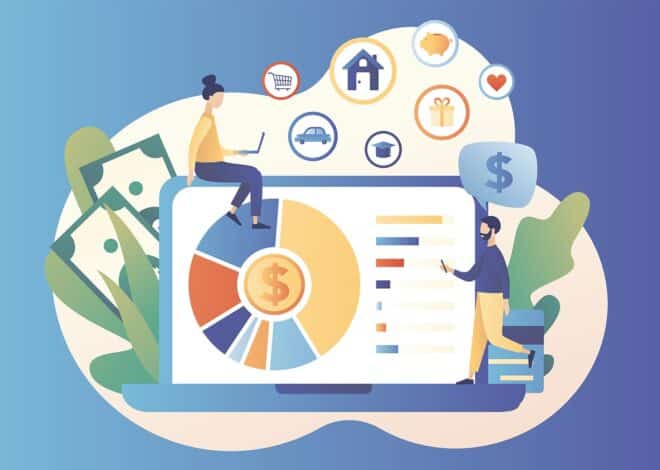What Nonprofits are Saying About the Bailout: A Fast Roundup
A quick roundup of just a few of the most compelling and informative nonprofit commentaries around recent financial developments.

What to think about the collapse of the financial services industry?
Conservative blogs offer plenty of conversation about individual responsibility to live within one’s means, while on left-leaning blogs there is more talk about such individuals as victims of lenders that lured and pressured them into subprime mortgages that they could not pay.
But as community nonprofits we often find ourselves on both sides of this fence: on one hand challenging human service clients to take more personal responsibility for themselves, and on the other hand, pushing for banking and other regulation that would make it harder for financial institutions to take advantage of ordinary people.
Hundreds of nonprofits across the U.S. – from advocacy groups to local community co-ops – work directly or indirectly to bring about financial systems reform. They have offered a variety of responses to the dramatic events involving our largest banks and the federal government. Just as politicians, economists and bloggers on the left and right have different responses, so do nonprofits.
Here’s a quick roundup of just a few of the most compelling and informative nonprofit commentaries:
Mergers and Acquisitions
“Washington and Wall Street Merge,” said the eye-catching headline at OMB Watch, a Washington-based nonprofit watchdog, wryly and succinctly describing the recent proposed federal interventions in the financial institutions crisis:
“Since its role in the sale of investment bank Bear Stearns to rival J.P. Morgan in March, the federal government has intervened three times in the nation’s financial markets by using taxpayer dollars . . . Following a string of guarantees, buyouts, and bailouts for various financial firms, Congress is now rushing to authorize the Treasury Secretary to spend $700 billion to bail out the rest of Wall Street.
“The upshot of these market interventions, for better or ill, is that the federal government has added to its balance sheet potentially hundreds of billions, perhaps even trillions, of dollars in bad debt. And while economists and policymakers may argue the importance of bailing out Wall Street, they can carry out only the most rudimentary of cost-benefit analyses, because they are working in such an information void.rs to prop up the value of various private banking and mortgage entities.” Read the whole article here.
A California Group’s Recommendations
Finance-related nonprofits such as the California Reinvestment Coalition take on financial system reform in a number of ways, including trying to get banks to allow poor people to open checking accounts so they are less likely to use paycheck cashing services and payday lenders.
Decrying “$700 Billion to the Wrong People,” the coalition, a member of the National Community Reinvestment Coalition, proposes that Congress:
- Impose a 6-month moratorium on foreclosures to allow families to remain in their homes while working with housing counseling agencies and their loan servicers to negotiate an affordable workout plan that will keep them in their homes.
- Reform the bankruptcy code to allow judges to modify all home loans. Judges are allowed to modify the loans on second homes, so there is no reason why they should not be able to do this for first-time homeowners.
- Ensure that long-term, affordable loan modifications are given to borrowers struggling to make their payments…In addition, homeowners should have their principal brought down to an amount that equals the current value of their home (if there is evidence of predatory lending in the making of their loan).
- Reform our regulatory structure so that financial firms are subject to meaningful oversight that will deter abusive practices that maximize profit but destroy neighborhoods.
Five Bailout Principles
With a different focus but similar intents, the conservative think-tank Center for Economic and Policy Research had similar comments and suggestions in Principles to Guide the Bailout:
- Financial institutions should be forced to endure the bulk of the losses with taxpayer funds only used where absolutely necessary to sustain the orderly operation of the financial system.
- The bailout must be designed to minimize the opportunity for gaming.
- The bailout should be designed to minimize moral hazard.
- In the case of delinquent mortgages that come into the government’s possession, there should be an effort to work out an arrangement that allows the homeowner to remain in her house as owner. If this proves impossible, then former homeowners should be allowed to remain in their homes as renters paying the market rent. This should be done even if it leads to losses to the government.
- There should be serious efforts to severely restrict executive compensation at any companies that directly benefit from the bailout.
A Credit Card Crisis in the Offing?
The nonprofit Consumers Union — which publishes the magazine Consumer Reports — called attention to the parallels in the credit card industry and warns that similar problems could erupt in that arena:
“Abuses in the credit card market are intimately related to the mortgage crisis. Unaffordable credit card debt induced many Americans to refinance their homes, but the home equity escape valve can no longer mask abusive lending practices that contributed to this run up in debt.
Rising mortgage costs have also pushed families to pay for necessities on their credit cards, such as food and medical care. Media reports indicate that some families are even forgoing payments on their mortgage loans in order to maintain a means of paying for these necessities.
“However, the credit card industry has not learned the lessons of the mortgage crisis. Luring consumers into incurring debt with deceptively low offers and then dramatically escalating the cost of that debt once it is assumed is both unfair to consumers and an unsound banking practice, whether the debt incurred is a mortgage or a credit card loan.”
Let Community Voices Be Heard
In the face of national handwringing, community nonprofits across the political spectrum have plenty of knowledge that can help the country respond to the critical question of “what next?” These organizations offer a range of options, from overarching principles to practical solutions.
Not much good will come of this turn of events, but if the voices of these community groups – steeped in the concrete experiences of the communities they serve – can rise above the din, we might be able to change the conversation in ways that will ease the pain.
About the Author
Blue Avocado is an online magazine fueled by a monthly newsletter designed to provide practical, tactical tips and tools to nonprofit leaders. A small but mighty team of committed social sector leaders produces the publication, enlisting content from a wide range of practitioners, funders, and experts.
Articles on Blue Avocado do not provide legal representation or legal advice and should not be used as a substitute for advice or legal counsel. Blue Avocado provides space for the nonprofit sector to express new ideas. Views represented in Blue Avocado do not necessarily express the opinion of the publication or its publisher.












If a non-profit organization were to get itself in a similar situation who would bail us out? That is the question that comes to my mind. As it stands right now if you get a government contract the level of oversight and agency accountability if overwhelming even if you are a small organization. If we miss filling our tax forms we are threatened with heavy fines that can devastate us financially. There is a double standard when it comes to Walls Street and for profit corporations. If find it disgusting that our government let this happen even after the many warning signs. If find it even more appalling that our tax dollars are going to bail these institutions that helped create the crisis they are facing.
I like the idea of nationalizing the banking system – and then turning them all into nonprofit organizations. I think we have all realized it was greed that got us into this mess in the first place; if we remove the profit motive, then these institutions can serve the greater good. (Actually, I think we should do that in several sectors, but then, I am anti-capitalistic in general.) But it galls me to hear yet another politician say we should let the “free market” solve the problem – I shake my head in sorrow that they just don’t get it.
I like the idea of nationalizing the banking system – and then turning them all into nonprofit organizations. I think we have all realized it was greed that got us into this mess in the first place; if we remove the profit motive, then these institutions can serve the greater good. (Actually, I think we should do that in several sectors, but then, I am anti-capitalistic in general.) But it galls me to hear yet another politician say we should let the “free market” solve the problem – I shake my head in sorrow that they just don’t get it.
Well I think this is all because the Global Financial Crisis that shook our economy. Many people are affected even the wealthiest persons in the world. The current economy has a lot of people looking for an online payday loan before it is too late. The tendency for companies to enact massive amounts of layouts seems to becoming quite the in style thing to do, as more companies have announced job cuts amounting to 45,000 jobs on Monday having been cut, creating more and more people that need a payday loan. The unemployment rate is continuing to rise, and it has hit levels higher than they have been since the Great Depression. Workers then couldn’t get a payday loan if they needed. Read more about the economy and payday loans at the Personal Money Store money blog.
Well I think this is all because the Global Financial Crisis that shook our economy. Many people are affected even the wealthiest persons in the world. The current economy has a lot of people looking for an online payday loan before it is too late. The tendency for companies to enact massive amounts of layouts seems to becoming quite the in style thing to do, as more companies have announced job cuts amounting to 45,000 jobs on Monday having been cut, creating more and more people that need a payday loan. The unemployment rate is continuing to rise, and it has hit levels higher than they have been since the Great Depression. Workers then couldn’t get a payday loan if they needed. Read more about the economy and payday loans at the Personal Money Store money blog.
It would seem quite powerful to have foundations acting counter-cyclically, giving more because the need is higher. But since grantmaking budgets are driven by the five percent “rule”, the plain fact is that for many foundations their grant-making budgets will be falling.
well worth the read. in my opinion, failure to take heed of the changing structure of the financial services industry is partially responsible for the current economic crisis.


DOC WALLER:It depends. Have you hit the 15 month deadline to file for 501(c)(3) since you incorporated? (I think that there is an automatic extension of another 12 months if you don't meet that deadline, anyway). If you have, then you should consider filing so you don't have any tax liability (although if it would be less than the $850, it may be worth it to wait). But as long as you're within that time period since you've incorporated, or if you haven't incorporated yet, you should wait.The exception is if you're gonna be looking to get grants to be a main part of your funding if the 501(c)(3) status and determination letter is gonna be super important to your orgs ability to get money to function, then you should probably apply as soon as you can afford it.
DOC WALLER:It depends. Have you hit the 15 month deadline to file for 501(c)(3) since you incorporated? (I think that there is an automatic extension of another 12 months if you don't meet that deadline, anyway). If you have, then you should consider filing so you don't have any tax liability (although if it would be less than the $850, it may be worth it to wait). But as long as you're within that time period since you've incorporated, or if you haven't incorporated yet, you should wait.The exception is if you're gonna be looking to get grants to be a main part of your funding if the 501(c)(3) status and determination letter is gonna be super important to your orgs ability to get money to function, then you should probably apply as soon as you can afford it.